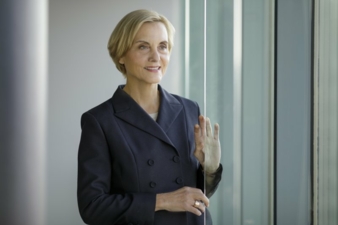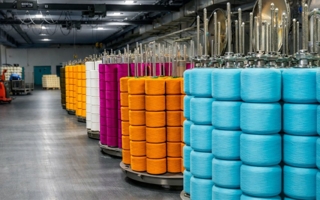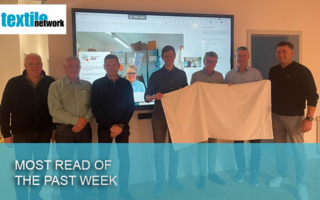27/01/2020 – Europe, the Textile Continent – Opportunities and Risks, Part 1 — auf Deutsch lesen
It all depends on Europe!
No Green Deal without textiles – Ingeborg Neumann talks to textile network in the first part of this year’s series on “Europe, the Textile Continent – Opportunities and Risks”.
textile network: Ms Neumann, at textile network we are focusing our attention this year on the European textile industry. As a textile entrepreneur, you operate seven sites in Europe, four of which are located in Germany. How important is Europe for Germany’s textile industry?
Ingeborg Neumann: For textile companies like ours, Europe isn’t just our most important sales market. We also know that we are only strong in Europe if we stand together. No country can rise to the challenges of climate change on its own, or deal with the trade conflicts between the USA and China. No country can drive an intelligent trade policy single-handedly. We are only strong together. We can only represent our interests properly if we stand together – particularly when you consider how rapidly the global balance of power is changing and how Europe’s role is becoming weaker rather than stronger.
textile network: Would you say that there is a general awareness of a European textile industry?
Ingeborg Neumann: The majority of our SMEs operate globally. Around 40 percent of our sales are generated through exports. That’s why we appreciate the importance of having an EU that is strong and can act. During the European elections we launched our own campaign to express the importance of this notion. In our companies, we wholeheartedly encouraged everyone to use their vote. When it comes to pulling together and acting with one voice in the European textile industry, there’s always room for improvement. Our European association Euratex has been relaunched and, in my opinion at least, it has got off to an excellent start. Now, we need to build on it.
textile network: What are the most important priorities for the textile industry in Europe over the next few years?
Ingeborg Neumann: They most certainly lie in the ambitious plans to become climate-neutral by 2050. What will happen if we don’t have enough renewable energy, what will our machines run on? In a recent study, our colleagues in the chemicals industry calculated various pathways to emission-free industrial production. The study found that, from the mid-2030s, electricity requirements in the chemicals industry alone would consume all of Germany’s current electricity output today. If we fail to act sensibly and find some middle ground, climate policy will not only fail to create jobs, but it will morph into an industry destruction programme.
textile network: And what would your solution be?
Ingeborg Neumann: The European industry mustn’t be robbed of its international competitive edge, especially not in manufacturing, otherwise we’ll be forced to close our production sites. It would be truly absurd if we ended up forcing our SMEs, who work to the highest environmental and social standards in the world and achieve high levels of efficiency, to move their production sites outside Europe.
textil network: What you’re describing sounds rather bleak...
Ingeborg Neumann: When it comes to energy, we’re facing a very serious problem. Germany already has the world’s highest electricity prices and every decision we make here in Germany and in Europe ultimately affects our ability to remain competitive internationally. If we want to be living and working climate-neutrally by 2050, manufacturing will have to make huge investments. But I’d also like to talk about opportunities. In the textile industry, we’ve used the past few decades to research many pioneering innovations and to tap into entirely new applications for textile materials.
textile network: Could you give me an example?
Ingeborg Neumann: Well, we can no longer plan our future cities as concrete deserts. Climate-neutral, modern architecture requires new solutions. A fabric made from high-strength polyester or glass-fibre material can carry, for example, between 20 and 50 t per running metre. It can, therefore, be used to build roofs that can easily span 50m but are only 1mm thick. And then there’s the field of heat insulation as well as filter technology for air and wastewater. No green deal will ever work without textiles.
textile network: Would you say the same for apparel?
Ingeborg Neumann: But, of course. The changes are well under way, changes that will be initiated through innovation, also in the field of apparel. We’ll see completely new sustainable materials, new production technologies, a clever circular economy, moving far beyond textiles to include other industries as well. The European textiles industry isn’t short of innovations. Many people are working on pioneering solutions at our universities and research institutes.
textile network: Even so, the industry is still struggling to attract new talent. The incoming President of Euratex, Alberto Paccanelli, described the shortage of qualified staff as the biggest concern facing European textile companies.
Ingeborg Neumann: That’s why we’re in constant dialogue with other European associations. If you take a closer look at our educational establishments, you’ll find they have fantastic teaching staff, lecturers, young apprentices and students who are fully committed to embracing change and the need for fundamental transformation. Last November, we took this process of transformation to the Red Carpet at the Federal Press Ball in Berlin. The guests from the worlds of politics, business and culture were impressed not only by a dress made from algae but also by the elan of the young textiles experts who are already tackling tomorrow’s transformation today. I feel certain that examples such as these will catch on throughout Europe.
textile network: Germany is due to take on the EU Council Presidency in the second half of this year. How is the textile industry preparing for this?
Ingeborg Neumann: We are in talks with the government on all important issues. For example, we’re broaching the question of how supply chain transparency should be regulated in both a national and European context. I just want to make it clear that we, as a textile industry, are committed to respecting human rights and to fighting child labour. What I want to see in the debate is objectivity. Our SMEs not only create jobs in Germany but also worldwide. However, our environmental and social standards – the highest in the world – and our market power are far from being the measure of all things. That’s why we need a strong European Union, one that is committed to promoting good government, workers’ rights, the right to education and the equality of women in the countries themselves. These are all issues to which we can contribute our knowledge and experience. Whenever the EU Commission or the EU Parliament approaches us, we’re always happy to engage with them.
Ms Neumann, many thanks for talking to us!
The questions were asked on behalf of textile network by Iris Schlomski.




